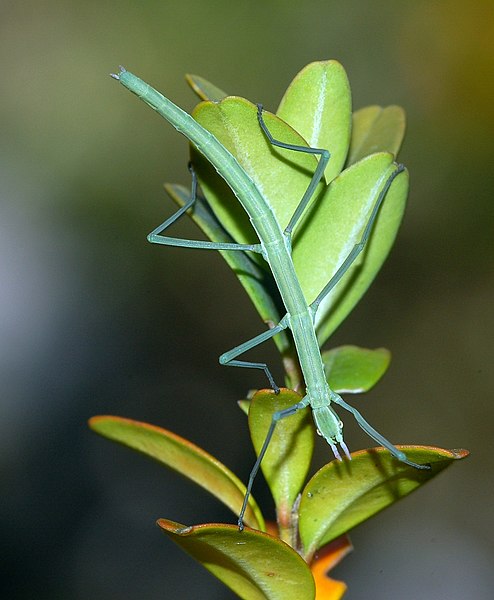Dryococelus australis, commonly known as the Lord Howe Island stick insect or tree lobster, is a species of stick insect that lives on the Lord Howe Island Group. It is the only member of the monotypic genus Dryococelus. Thought to be extinct by 1920, it was rediscovered in 2001. It is extirpated in its largest former habitat, Lord Howe Island, and has been called "the rarest insect in the world", as the rediscovered population consisted of 24 individuals living on the small islet of Ball's Pyramid.
Dryococelus australis
Museum specimen
The Phasmatodea are an order of insects whose members are variously known as stick insects, stick-bugs, walkingsticks, stick animals, or bug sticks. They are also occasionally referred to as Devil's darning needles, although this name is shared by both dragonflies and crane flies. They can be generally referred to as phasmatodeans, phasmids, or ghost insects, with phasmids in the family Phylliidae called leaf insects, leaf-bugs, walking leaves, or bug leaves. The group's name is derived from the Ancient Greek φάσμα phasma, meaning an apparition or phantom, referring to their resemblance to vegetation while in fact being animals. Their natural camouflage makes them difficult for predators to detect; still, many species have one of several secondary lines of defense in the form of startle displays, spines or toxic secretions. Stick insects from the genera Phryganistria, Ctenomorpha, and Phobaeticus include the world's longest insects.
Phasmatodea
Phasmid in marginal forest on a pitcher plant, Philippines.
Phobaeticus serratipes
Female Phobaeticus chani, the world's second-longest insect. This species grows to a total length of 56.7 cm (22.3 in) (front legs fully extended) and body length of 35.7 cm (14.1 in).






